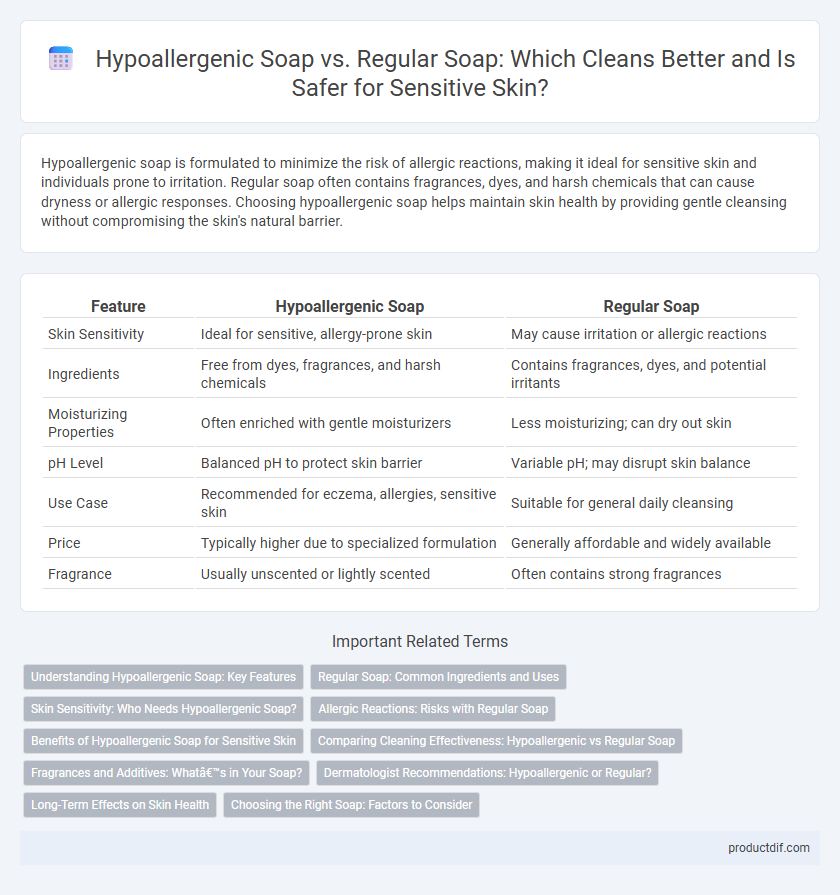Hypoallergenic soap is formulated to minimize the risk of allergic reactions, making it ideal for sensitive skin and individuals prone to irritation. Regular soap often contains fragrances, dyes, and harsh chemicals that can cause dryness or allergic responses. Choosing hypoallergenic soap helps maintain skin health by providing gentle cleansing without compromising the skin's natural barrier.
Table of Comparison
| Feature | Hypoallergenic Soap | Regular Soap |
|---|---|---|
| Skin Sensitivity | Ideal for sensitive, allergy-prone skin | May cause irritation or allergic reactions |
| Ingredients | Free from dyes, fragrances, and harsh chemicals | Contains fragrances, dyes, and potential irritants |
| Moisturizing Properties | Often enriched with gentle moisturizers | Less moisturizing; can dry out skin |
| pH Level | Balanced pH to protect skin barrier | Variable pH; may disrupt skin balance |
| Use Case | Recommended for eczema, allergies, sensitive skin | Suitable for general daily cleansing |
| Price | Typically higher due to specialized formulation | Generally affordable and widely available |
| Fragrance | Usually unscented or lightly scented | Often contains strong fragrances |
Understanding Hypoallergenic Soap: Key Features
Hypoallergenic soap is formulated to minimize the risk of allergic reactions by eliminating common irritants such as fragrances, dyes, and harsh chemicals. It often contains gentle, natural ingredients like glycerin and oatmeal that soothe sensitive skin while effectively cleansing. Unlike regular soap, hypoallergenic options prioritize skin compatibility, making them ideal for individuals with eczema, psoriasis, or other dermatological sensitivities.
Regular Soap: Common Ingredients and Uses
Regular soap typically contains a combination of sodium or potassium salts of fatty acids, fragrances, dyes, and preservatives that contribute to its cleansing properties and sensory appeal. Common ingredients include sodium lauryl sulfate or sodium laureth sulfate, which create a rich lather essential for removing dirt and oils from the skin. This type of soap is widely used for general body cleansing, handwashing, and household cleaning due to its effective degreasing and antibacterial properties.
Skin Sensitivity: Who Needs Hypoallergenic Soap?
Hypoallergenic soap is formulated without common irritants such as fragrances, dyes, and harsh chemicals, making it ideal for individuals with sensitive or allergy-prone skin. Regular soap often contains ingredients that can trigger redness, dryness, or rashes in those with delicate skin types. People experiencing eczema, rosacea, or frequent skin irritation benefit most from using hypoallergenic soap to maintain skin health and reduce inflammatory reactions.
Allergic Reactions: Risks with Regular Soap
Regular soap often contains fragrances, dyes, and harsh chemicals that can trigger allergic reactions such as redness, itching, and skin irritation in sensitive individuals. In contrast, hypoallergenic soap is formulated without common allergens and irritants, significantly reducing the risk of contact dermatitis and allergic responses. Choosing hypoallergenic soap is essential for people prone to allergies or those with compromised skin barriers to maintain skin health and comfort.
Benefits of Hypoallergenic Soap for Sensitive Skin
Hypoallergenic soap is formulated without common irritants and harsh chemicals, reducing the risk of allergic reactions and skin inflammation for sensitive skin types. Its gentle ingredients help maintain the skin's natural moisture barrier, preventing dryness and irritation often caused by regular soap. Choosing hypoallergenic soap enhances comfort and skin health, especially for individuals prone to eczema, psoriasis, or dermatitis.
Comparing Cleaning Effectiveness: Hypoallergenic vs Regular Soap
Hypoallergenic soap often contains milder ingredients that reduce skin irritation but may have less antibacterial potency compared to regular soap formulated with stronger detergents and antimicrobial agents. Regular soap typically provides more robust cleaning effectiveness by efficiently removing dirt, oils, and bacteria due to higher surfactant concentrations. However, hypoallergenic soap balances gentle cleansing with sufficient efficacy for sensitive skin, making it ideal for users prone to allergies or skin conditions.
Fragrances and Additives: What’s in Your Soap?
Hypoallergenic soap is formulated without common fragrances and harsh additives that often trigger skin irritation, making it suitable for sensitive skin types. Regular soap typically contains synthetic fragrances and preservatives that can cause allergic reactions or dryness for some users. Choosing hypoallergenic options ensures a gentler cleansing experience by minimizing exposure to potentially irritating chemicals.
Dermatologist Recommendations: Hypoallergenic or Regular?
Dermatologists often recommend hypoallergenic soap for individuals with sensitive or allergy-prone skin because it minimizes the risk of irritation and allergic reactions by excluding common allergens and harsh chemicals. Regular soap may contain fragrances, dyes, and preservatives that can cause dryness, redness, or dermatitis in vulnerable skin types. Choosing a hypoallergenic soap supports skin barrier health and reduces inflammation, making it the preferred option for those seeking gentle cleansing solutions.
Long-Term Effects on Skin Health
Hypoallergenic soap minimizes the risk of irritation and allergic reactions by avoiding common allergens and harsh chemicals, promoting healthier skin over time. Regular soap often contains fragrances and sulfates that can strip natural oils, leading to dryness and increased sensitivity with prolonged use. Consistent use of hypoallergenic soap supports skin barrier integrity, reducing the likelihood of chronic skin conditions such as eczema and dermatitis.
Choosing the Right Soap: Factors to Consider
Hypoallergenic soap minimizes skin irritation by excluding common allergens like fragrances and dyes, making it ideal for sensitive or allergy-prone skin. Regular soap often contains added perfumes and chemicals that can disrupt the skin's natural barrier, leading to dryness or allergic reactions. When choosing the right soap, consider your skin type, potential sensitivities, and the soap's ingredient list to ensure effective cleansing without compromising skin health.
Hypoallergenic soap vs Regular soap Infographic

 productdif.com
productdif.com